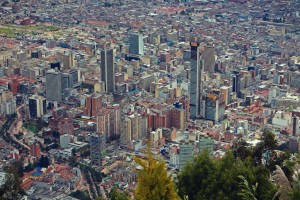 In a country that is notorious for sending the United States its supply of the illegal drug cocaine, Columbia’s Kogi tribes are farming coffee fields instead of coca fields. A telling new article featured in the Miami Herald, details just how the government is helping this tribe create a new life, away from the illegal substance that continues to plague our nation.
In a country that is notorious for sending the United States its supply of the illegal drug cocaine, Columbia’s Kogi tribes are farming coffee fields instead of coca fields. A telling new article featured in the Miami Herald, details just how the government is helping this tribe create a new life, away from the illegal substance that continues to plague our nation.
According the article, Columbia Encouraging Coffee Farming from Kogi tribe, based in the Sierra Nevada de Santa Marta, were known to have various coca farms in their region. For the people living within the Kogi tribe, coca farming is known to be more of a spiritual affair than an illegal trade.
The Kogi tribe believe that the coca leaf “has spiritual properties.” Men consume the leaf following a “coming of age ceremony.” Those that produce the leaf do so to “sell it as an affront to the `ancestral mother.'”
For the Kogi, the struggle to honor their traditions while engaging in illegal activity is tough. The Columbian government have recently stepped in to help many of the Kogi families to replace their coca farms with fields of coffee farms. The government intervened in an attempt to combat what has become a national problem for the country. These efforts to combat the country’s coca fields has met its setbacks.
Just recently, the government decided to stop spraying local coca fields with glyphosate, which is a weed remedy, after they found that the pest deterrent may be a carcinogen which could impact the population. Their only act of recourse against the farms is to physically remove the plant, “which is both slow and dangerous,” while many farmers may refuse to change their crop.
United Nations official Yury Fedotov believes that “Alternative development is very important. And it may be the only possibility to eradicate illicit coca cultivation.”
The Ministry of Justice has said that from the years 2006-14, the country has used about $375 million into projects aimed at families who produce and harvest the coca plant. Thus far, “the programs have kept 2,100 tons of cocaine off the market.”
These efforts have small successes that the country is seeing, one of which includes a quarter of all rubber produced coming from the replacement programs that the government is trying to implement.
The country has seen a significant jump in coca farms as many are controlled by “armed groups” who encourage farmers to produce the plant.
Officials believe that there is still more work ahead. Even though the substitution programs are making slow progress, the work that needs to happen include new roads and pathways, sewage systems, and electricity to areas of concern.
Unfortunately for Columbia, there are many areas in the country that continue to be inhabited and controlled by “guerillas and criminal gangs,” which is a deterrent for authorities who are trying to implement change.
Some of the benefits of the crop exchange program include safety for families. One man details his experience of working a coffee farm instead of a coca farm. He stated that his former coca farm was run by an illegal group who controlled most of his farming. Since his change he said that his family is safe and he can work during the day without any worry. This safety does come with a cost. He is no longer generating the large income that his former crop produced.
Other farmers like the Kogi tribe are seeing the fruits of their labor. Some of which includes the sale of their coffee in markets in the country, in the U.S. and in Germany.
Tribesman are using their profits to buy more “ancestral land and expand their coffee farms.”
Columbia still has a long way to go but the efforts are not going unnoticed as they continue to battle the war on drugs while helping a conflicted population.
New Directions for Women is a treatment facility located in California that offers help for alcohol dependency to women of all ages, pregnant women in any trimester, and women with children. Founded in 1977, our courageous and visionary founders asked for the help of Newport Beach Junior League members to fulfill their vision of a tranquil home-like facility that would treat women with dignity and respect. Our caring admissions counselors are available 24/7 to take your call and answer any questions you may have on getting help. Reach us by phone at 800-93-WOMEN. We can help. Stay in the loop with New Directions for Women by connecting with us on Twitter, Facebook, or LinkedIn.











